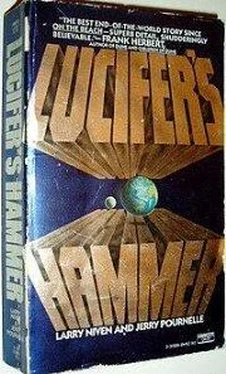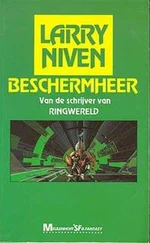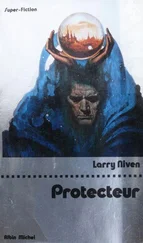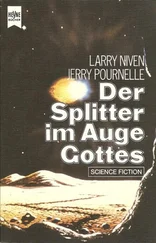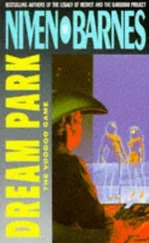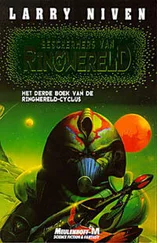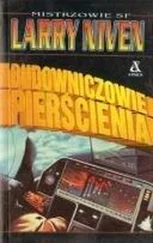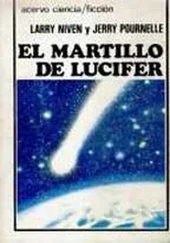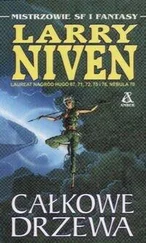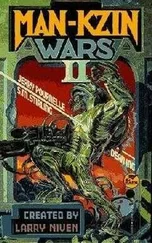It had all turned dead serious. Harvey asked, “But what stops ice ages?”
Forrester and Sharps shrugged in unison.
“So,” Hamner said, “my comet’s going to bring about an ice age?” Now you could see the long lugubrious face of his grandfather, who could look bereaved at a $60,000 funeral.
Forrester said, “No, that was hot fudge sundae we were talking about. Um — the Hammer is bigger.”
“Hamner-Brown. How much bigger?”
Forrester made an uncertain gesture. “Ten times?”
“Yes,” said Harvey. There were pictures in his mind. Glaciers marched south across fields and forests, across vegetation already killed by snow. Down across North America into California, across Europe to the Alps and Pyrenees. Winter after winter, each colder, each colder than the Great Freeze of ’76–’77. And hell, they hadn’t even mentioned the tidal waves. “But a comet won’t be as dense as a cubic mile of h-h-h—”
It was just one of those things. Harvey leaned back in his chair and belly-laughed, because there was just no way he could say it.
Later he made his own tape, alone, in a studio approximation of an office — fake books on the shelves, worn carpet on the floor. Here he could talk.
“Sorry about that.” (This would run just after one of Harvey’s breakups. He’d done that several times in the Sharps interview.) “The points to remember are these. First, the odds against any solid part of Hamner-Brown hitting us are literally astronomical. Over these distances even the Devil himself couldn’t hit a target as small as Earth. Second, if it did hit, it would probably be as several large masses. Some of those would hit ocean. Others would hit land, where the damage would be local. But if Hamner-Brown did strike the Earth, it would he as if the Devil had struck with an enormous hammer, repeatedly.”
Fifty thousand years ago in Arizona:
Friction with the air makes the surface incandescent as the oxygen in the atmosphere blowtorches the iron. From this great flying mass, sputtering chunks as large as houses fly of’ as the meteoroid, travelling at a low angle, nears the ground. A huge cylinder of superheated air is forced along by the meteoroid and, as it strikes, this air is forced across the surrounding countryside in a fiery blast that instantaneously scorches every living thing for a hundred miles in every direction.
Frank W. Lane,
The Elements Rage (Chilton, 1965)
Leonilla Malik scribbled a prescription and handed it to her patient. He was the last for the morning, and when the man had left her examining room, Leonilla took the bottle of Grand Marnier from her lower desk drawer and poured a small, precious glass. The expensive liqueur was a present from one of her fellow kosmonauts, and drinking it gave her a delicious feeling of decadence. Her friend also brought her silk hose and a slip from Paris.
And I’ve never been outside Russia, she thought. She let the sweet fluid roll over her tongue. No matter how I try, they will never let me go.
She wondered what her status was. Her father had been a physician with a fairly good reputation among the Kremlin elite. Then had come the “Doctors’ Plot,” an insane Stalinist delusion that the Kremlin physicians were trying to poison The Revolutionary Leader of Our Times, Hero of the People, Teacher and Inspired Leader of the World Proletariat, Comrade Josef Vissarionovich Stalin. Her father and forty other doctors had vanished into the Lubianka.
One of her father’s legacies was a 1950 copy of Pravda. He had carefully underlined every mention of Stalin’s name: ninety-one times on the front page alone, ten times as Great Leader, and six as Great Stalin.
He should have poisoned the bastard, Leonilla thought. It wasn’t a pleasant concept; there was a long tradition about that. The Oath of Hippocrates wasn’t taught in Soviet medical schools, but she had read it.
As the daughter of an enemy of the people, Leonilla’s future hadn’t seemed very bright; but then had come a new era, and Dr. Malik was rehabilitated. By way of reparations, Leonilla had been rescued from secretarial work in an obscure Ukrainian town and sent to the university. A liaison with an Air Force colonel had resulted in her learning to fly, and from that, weirdly, to her ambiguous status in the kosmonaut corps. The colonel was now a general and long since married, but he continued to help her.
She had never been in space. She had been trained for it, but she had never been chosen. Instead, she treated flyers and their dependents, and got in flying time when she could, and hoped for a lucky break.
There was a tap at the door. Sergeant Breslov, a young man of no more than nineteen years, proud to be a sergeant in the Red Army; only, of course, it wasn’t the Red Army anymore and hadn’t been since Stalin had been forced to rename it during what he had to call The Great Patriotic War. Breslov would have preferred the Red Army. He often talked of carrying freedom across the world on the point of his bayonet.
“There is a long message for you, Comrade Captain. You have been transferred to Baikunyar.” He frowned at the bottle which Leonilla had forgotten to put away.
“Back to work,” Leonilla said. “That is worth celebration. Will you join me?” She poured a glass for Breslov.
He drank standing at stiff attention. It was one way of showing disapproval of officers who drank before lunch. Of course, many of them did, which to Breslov was another indication of how things had gone downhill since the Red Army days his father boasted of.
In three hours she was flying toward the spaceport. She could hardly believe it: urgency orders, authorizing her to fly a jet trainer, her belongings to be sent after her. What could be so important? She pushed the question from her mind and reveled in the joy of flying. Alone, in the clear skies, no one looking over her shoulder, no other pilots eager for their chance at the stick: ecstasy. Only one thing could be better.
Could that be why they’d sent for her? She knew of no space missions. But perhaps. I’ve been lucky for a long time. Why not more luck? She imagined being in a real Soyuz waiting for the big boosters to roar and fling the spacecraft up into clean space, and for the hell of it she flipped the jet trainer into a series of aerobatics that would have got her grounded if anyone had been watching.
A sudden gust across the San Joaquin Valley shook the trailer slightly, bringing Barry Price to instant wakefulness. He lay still, listening for the reassuring sound of the bulldozers, his crews were still at work on the nuclear power plant. There was light outside. He sat up carefully to avoid waking Dolores, but she stirred and opened one eye. “What time is it?” she asked, her voice heavy with sleep.
“About six.”
“Oh, my God. Come back to bed.” She reached for him. The covers fell away, revealing her tanned breasts.
He moved away, avoiding her, then caught her hands in one of his and held them while he bent to kiss her. “Woman, you’re insatiable.”
“I haven’t had any complaints yet. Are you really getting up?”
“Yes. I’ve got engineering work to do, and we’ve got visitors later, and I’ve got to read that memo McCleve sent over yesterday. Should have got to it last night.”
She grinned muzzily. “Bet what we did was more fun. Sure you won’t come back to bed?”
“No.” He went to the sink and ran water until it was hot.
“You wake up faster than any man I’ve ever known,” Dolores said. “I’m not getting up at the crack of dawn.” She pulled the pillow over her head, but she continued to move slightly under the covers, letting him know she was awake.
Читать дальше
